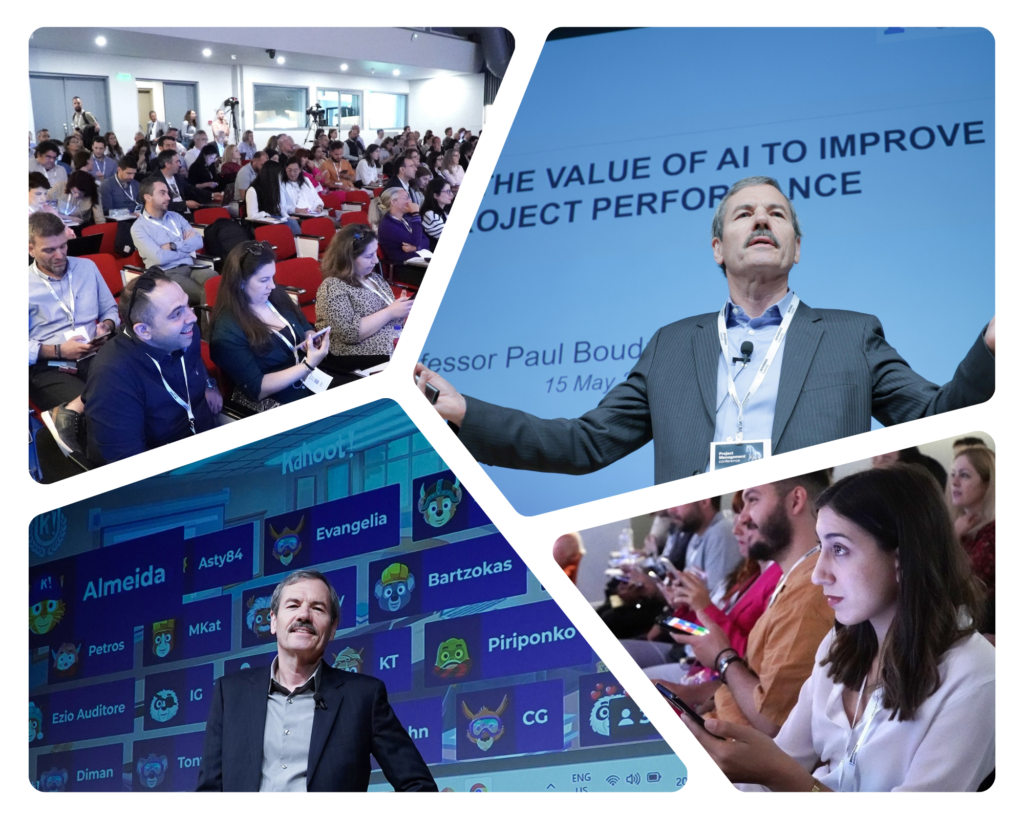Introduction
In today’s fast-paced and ever-evolving project management landscape, harnessing the potential of artificial intelligence (AI) is no longer a futuristic concept but a present-day necessity. At the 19th Project Management Conference in Athens, Greece, Professor Paul Boudreau from Algonquin College, Ottawa, and a renowned author, illuminated the transformative power of AI in improving project performance through his insightful presentations. His thought-provoking sessions, “Unlock the Value of AI to Improve Project Performance” and “AI Fundamentals: How Project Managers Can Apply AI to the Project Methodology,” offered a comprehensive overview of AI’s capabilities and its practical applications in project management.
Day One: Demystifying AI for Project Managers
On the first day, Professor Boudreau tackled the prevalent misconceptions surrounding AI and underscored its mathematical foundation rather than mythical allure. He stated emphatically, “AI is about math not myth,” setting the tone for a deep dive into the actual workings of Artificial Intelligence. AI, he explained, involves complex calculus equations and machine learning algorithms that enable systems to learn from data, make predictions, and even refine their understanding through continuous feedback.

The Project Challenge
One of the stark realities highlighted by the presenter is the current state of global project management. According to a PwC report, the global demand for infrastructure projects is $3.9 trillion. 85% of these projects are running over budget (KPMG) and 11% of project spending is wasted due to poor performance (PMI). “We must take advantage of the new technology”, stated Professor Boudreau emphasising the need for innovative solutions, a problem that AI can help mitigate through data-driven decision-making

AI Transformation
Artificial Intelligence’s transformative potential in project management is anchored in its ability to process vast amounts of data and derive actionable insights. Professor Boudreau introduced key AI concepts such as supervised learning, unsupervised learning, and reinforcement learning, each offering unique benefits for project management.
- Supervised Learning: This involves training AI models on historical project data to predict outcomes such as project success or failure. By analysing 87 factors from past projects, these models can provide highly accurate predictions and help managers preempt potential issues.
- Unsupervised Learning: Here, AI clusters data based on similarities without pre-defined labels, which is invaluable for tasks like risk classification and change management. For instance, AI can classify change orders based on characteristics such as the scope and timing, helping managers make informed decisions on project alterations.
- Reinforcement Learning: This method uses ongoing feedback to improve decision-making processes. Boudreau illustrated this with the analogy of learning to ride a bicycle, where continuous practice and adjustment lead to mastery. Similarly, AI systems can refine their performance by learning from each decision’s outcomes.
The Importance of Data
Data is the lifeblood of AI. The speaker emphasised that making decisions based on comprehensive and accurate data rather than opinions is crucial. For project managers, this means leveraging data from project documents, status reports, environmental conditions, and historical results to inform AI-driven insights.


Day Two: Mastering AI Fundamentals
The second day of the conference, dedicated to masterclasses, saw Professor Boudreau delve deeper into the practical applications of AI through his session on AI fundamentals. He elaborated on the predictive and classification capabilities of AI, providing a robust framework for project managers to understand and deploy AI technologies effectively.

The Power of Prediction and Classification
The presenter showcased how AI’s predictive capabilities could revolutionise project management. By employing supervised learning models, project managers can predict various aspects of project performance, including budget overruns, schedule delays, and resource allocation issues. These predictive models use historical data to generate insights that can preventively address potential problems.
- Prediction Templates: AI can generate templates for predicting project outcomes in areas such as agile sprint planning, risk management, stakeholder engagement, and vendor execution. These templates offer customizable features to cater to specific project needs, providing managers with a tailored approach to prediction.
- Classification: Unsupervised learning models classify data into meaningful groups. For example, AI can classify tasks based on complexity, helping managers allocate resources more efficiently. This classification extends to risk assessment, change order management, and identifying critical project issues.

Data Management for AI
Effective AI deployment hinges on robust data management practices. The speaker stressed the importance of structured data and the process of data wrangling, which involves cleaning, transforming, and maintaining data to ensure its quality. He highlighted the significance of data cleaning, citing an IBM study that found poor data quality costs the U.S. economy $3.1 trillion annually. Ensuring data is accurate, complete, and consistent is paramount for reliable AI outcomes.
Large Language Models (LLMs)
Professor Boudreau introduced the concept of Large Language Models (LLMs) like ChatGPT, which have revolutionised natural language processing (NLP) in project management. These models process and understand human language, enabling applications such as virtual assistants that can retrieve information, understand project management concepts, and even generate project documentation.
LLMs can create project scope templates, define project plans, generate schedules and budgets, identify risks, and formulate communication plans. This generative capability enhances productivity by automating routine tasks and providing managers with more time to focus on strategic decision-making.

Practical Applications and Case Studies
To illustrate AI’s practical applications, Professor Boudreau shared compelling case studies from various industries:
- Software Projects: Using NLP to improve the accuracy of user stories, AI can detect errors and omissions in requirements, significantly reducing defects in production.
- Infrastructure Projects: Machine learning predictions enhance capital productivity and cost forecast accuracy, providing early warnings for potential issues.
- Defence Contracting: AI optimises resource allocation across large portfolios, analysing historical and future resource loads to ensure efficient use of resources.
Overcoming AI Myths and Challenges
Despite its vast potential, AI adoption in project management faces several myths and challenges. The presenter debunked common myths such as the need for vast amounts of data and the fear of AI eliminating project management jobs. He clarified that AI is a collaborative tool designed to enhance human capabilities, not replace them.
Ethical Considerations
Ethical issues such as data bias, privacy concerns, and transparency are critical considerations in AI deployment. Boudreau highlighted the importance of ethical compliance and governance, advocating for continuous training and ethical standards to ensure AI systems are fair and accountable.
Skills for the AI-Driven Project Manager
To leverage AI effectively, project managers must equip themselves with new skills:
- AI Fundamentals: Understanding machine learning and NLP principles.
- Data Management: Mastering data wrangling, feature engineering, and data validation.
- Statistics: Grasping probability, correlation, and managing data outliers.
The presenter encouraged project managers to lead the change by integrating AI into their workflows, advocating for continuous learning and embracing new technologies to drive project success.

Getting Started with AI
For project managers ready to embark on the AI journey, Professor Boudreau provided a roadmap:
- Identify Project Problems: Determine the issues AI can address and create a business case.
- Develop a Data Strategy: Ensure data is well-structured and maintained.
- Build an AI Roadmap: Evaluate AI vendors or internal resources to define value propositions.
- Deploy AI Solutions: Implement AI technologies and monitor their impact on project performance.
- Deliver Improved Performance: Use AI-driven insights to enhance project outcomes continuously.
Engaging the Audience with a Quiz
The masterclass on Day 2 was not just about theory and case studies. Throughout the entire workshop session, Professor Boudreau conducted an engaging quiz session that captivated the audience. With approximately 150 attendees participating, the quiz was a lively and interactive way to reinforce the concepts discussed.
The first prize was Professor Boudreau’s third book, titled “Self-Driving Project: Using Artificial Intelligence to Deliver Project Success.” In this book, the author provocatively suggests that AI could take over the project manager’s role – a notion he does not truly believe but presents for the sake of sparking debate. Throughout the quiz, attendees who answered questions correctly were rewarded with additional prizes, making the session both educational and entertaining.



Conclusion: Embrace the AI Revolution
As AI continues to evolve, its integration into project management offers unprecedented opportunities for innovation and efficiency. Professor Paul Boudreau’s presentation and masterclass at the 19th Project Management Conference in Athens provided a compelling vision of AI’s potential to transform project management practices. By understanding the power of AI, project managers can navigate the complexities of modern projects with greater precision and effectiveness.
AI is not about myth but about the power of mathematics and data-driven insights. It is a flexible tool, ready to be applied by creative and forward-thinking project managers to unlock new levels of project success. The time to embrace AI in project management is now, and those who do will lead the charge into a more efficient, data-informed future.


About the Author

Lavinia Descultu, AI in Project Management Community of Action, PMI UK Chapter. With a deep interest in artificial intelligence, Lavinia is committed to integrating AI tools into her project management practices enhancing efficiency and driving results. She is a portfolio, program, and project professional with over two decades of experience in delivering innovative digital transformation.


